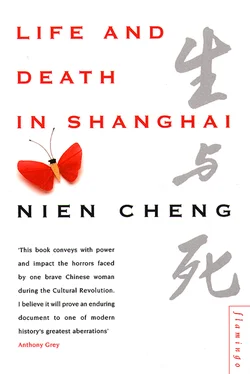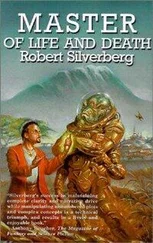She turned to leave. But at the door she looked back and gave me a sweet smile.
At the sink, the cook said, ‘Not all of them are young fools!’
Remembering that his youngest son was a high school student, I asked him whether the boy also belonged to the Red Guard organization.
‘Oh, yes! How could he not join? He would have been looked upon as a renegade and punished. Besides, young people always want to do exactly what other young people are doing. But when he comes home my wife searches him to make sure he hasn’t taken anything that doesn’t belong to him.’
‘Is there a lot of that kind of thing going on?’
‘Yes. The temptation is there. Some parents even encourage the youngsters to take things. But I’m not going to let my son be turned into a habitual thief,’ the cook said.
‘What about the children from capitalist families?’
‘They are having a hard time. They are made to feel like outcasts and required to draw a line between themselves and their parents. Young people can be very cruel to each other, you know. There have been an increasing number of suicides.’
Outside the kitchen, I saw a man who had not been present with the Red Guards the night before. I could tell by his air of self-assurance that he was a Party Official, perhaps a veteran of the Civil War, as he was obviously over forty.
‘I’m a liaison officer of the Municipal Government,’ he introduced himself to me. ‘It’s my job to inspect the revolutionary action of the Red Guards. Have you been beaten or ill treated?’
It was a pleasant surprise to learn that the Shanghai Municipal Government was endeavouring to check the excessive behaviour of the Red Guards. This attempt at moderation was to be very quickly curtailed by the Maoists in the Party leadership in Peking. The work of the liaison officer was short-lived. But when he spoke to me he was unaware of his own impending downfall and his manner was authoritative.
‘No, not at all,’ I said to him. ‘These Red Guards carried out their revolutionary action strictly according to the teachings of our Great Leader Chairman Mao. I have been allowed to eat and sleep.’ The Red Guards standing around us beamed.
He declared, ‘That’s good. It’s not the purpose of the proletarian class to destroy your body. We want to save your soul by reforming your way of thinking.’ Although Mao Tze-tung and his followers were atheists, they were very fond of talking about the ‘soul’. In his writing, Mao often referred to the saving of a man’s soul. During the Cultural Revolution, ‘soul’ was mentioned frequently. Several times, Defence Minister Lin Piao stood on the balcony of Tien An Men to speak on behalf of Mao Tze-tung to the Red Guards gathered below about allowing the revolutionary spirit to touch their ‘souls’ in order to improve themselves. While no one could ask Mao Tze-tung or Lin Piao what exactly they meant when they talked about a man’s ‘soul’, it greatly taxed the ingenuity of the Marxist writers of newspaper articles who had to explain their leader’s words to the people.
Then the liaison officer raised his arm and swung it in a circle to embrace the whole house. ‘Is it right for you and your daughter to live in a house of nine rooms with four bathrooms when there is such a severe housing shortage in Shanghai? Is it right for you to have each room covered with woollen carpets and filled with rosewood and blackwood furniture when there is a shortage of wood and basic furniture for others? Is it right for you to wear silk and fur and sleep under quilts filled with down? Is it right for you to have three servants to wait on you?’
He looked at me for a moment. When he saw I was not going to argue with him, he went on, ‘As I said a moment ago, it is not our objective to destroy your body. You will be allowed enough clothing and basic furniture to carry on a normal life but you won’t be allowed to maintain a standard of living above that of the average worker.’
He looked at me again for my reaction. Seeing none, he continued, ‘It’s now quite warm, but winter will be here soon. The Red Guards will take you upstairs to pack a suitcase of clothing for yourself. Pick a warm padded jacket. You won’t have central heating in this house again. Coal is needed for industry. It’s not for the luxury of the capitalist class.’
He went into the dining room and closed the door. I followed a Red Guard to the third floor to pick up warm clothes from the debris. A male Red Guard who had been there the night before but had gone away in the morning returned to the house. He came up the stairs two steps at a time and said to the girl helping me, ‘Incredible! It’s incredible! You know what I found when I went home? They are looting my house! How can they do this? My father and grandfather are both workers.’
Indeed, this was extraordinary. We stopped sorting the clothes and asked him to explain.
‘It’s my aunt. During the Japanese invasion, she lost everything when the Japanese soldiers burned her area of Nantao city. She borrowed money to have a fruit stall after the war. She did quite well and made a living for herself and her children but she gave it up two years ago when she got too old to manage it. Now they say she is a capitalist because she had a private business of her own. Our home is being looted because she is now living with us since her children are not in Shanghai.’
The young man was full of indignation and almost in tears. The incident was a terrible blow to a self-righteous and proud Red Guard who was the third generation of a working-class family. It was also an eye-opener for me. Apparently, I decided, there were capitalists and capitalists and some were more equal than others. If owners of fruit stalls were included in the category, the Red Guards in Shanghai had a big job to do.
More Red Guards joined us to hear the young man’s story. I noticed that a couple of them slipped away quietly afterwards, no doubt going home to investigate.
Thinking of my daughter, I asked the Red Guards for her winter clothes.
‘She is not included in our revolutionary action. We did not go to her room,’ they replied.
‘But her winter clothes are not in her room. They were put away for the summer up here,’ I told them.
Evidently mellowed by his own family’s experience, the boy whose home was looted volunteered, ‘We must pack a couple of suitcases for her too.’
My daughter and I were each allowed a suitcase with clothes and a canvas bag with bedding.
The work of destruction accomplished, the Red Guards were getting things ready for removal. By the afternoon, there were no more than a dozen of them left in the house. One of them called me to the dining room.
The liaison officer and two of the teachers were seated by the dining table which was strewn with old letters my grandfather had written to my father when the latter was a student in a naval college in Japan before the 1911 Revolution when China became a Republic. They were included among the family papers brought to my house after my widowed mother passed away in Nanking in 1962. I had never opened the boxes because they were to be sent to my brother in Peking. Being the eldest son, he was the rightful heir. I could see that the paper as well as the envelopes were yellow with age but the brush and ink handwriting of my grandfather had not faded.
After motioning me to sit down on a vacant chair, the liaison officer pointed to the letters and asked me, ‘Have you read these letters from your grandfather to your father?’
‘My father showed them to me when I was in my teens a long time ago,’ I told him.
‘Your grandfather was a patriot even though he was a big landlord. He sent your father, his eldest son, to Japan to learn to become a naval officer because China suffered defeat in the naval battle against Japan in 1895. He also took part in the abortive Constitutional Reform Movement. When that failed, he returned to his native province and devoted himself to academic work. Do you respect your grandfather?’
Читать дальше












